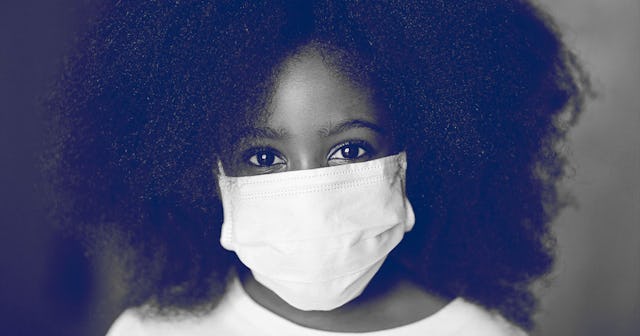A Child's Mental Health Is Not An Excuse To Throw COVID Caution To The Wind

Mental illness is a serious issue. An important issue. In fact, as a writer and someone living with bipolar disorder and anxiety disorder, it’s one of the issues nearest and dearest to my heart. I’ve spent the last six years of my life advocating for change — and mental health reform. But it isn’t the only public health crisis we’re facing today, and it’s time we (or, at the very least, I) address the elephant in the room. Yes, the coronavirus crisis has caused there to be an uptick in mental health-related conditions, but no, having said conditions doesn’t excuse you or your child from engaging in social distancing protocols or wearing a mask.
Period. End of discussion.
Of course, that may sound harsh, and maybe it is. I have a strict zero tolerance policy for rule breakers and bullshit — especially when said bullshit endangers the lives of others. When your careless decisions can affect me and my family.
I get it. I empathize. As a parent, I too am worried about my child’s mental health. I mean, schools across the country have shuttered. Sports and activities like gymnastics and dance have been put on hold, and in many regions, lockdown orders are in effect. In short, most kids aren’t going out or seeing their friends. They’re staring at computers, and staying home. And loneliness, fear, stress, and uncertainty are taking a toll.
According to a report from the Centers for Disease Control and Prevention, there has been a sharp uptick in mental-health related emergency room visits amongst teens, adolescents, and school-aged kids. In fact, compared with 2019, the proportion of mental health–related visits for children aged 5–11 and 12–17 years has increased 24%. and 31%, respectively. What’s more, the long-term impact of COVID-19 and quarantines remains to be seen. But depression doesn’t excuse you from stay-at-home orders. Anxiety doesn’t preclude you or your child from wearing a mask. And mental health issues do not give you carte blanche to skirt COVID rules.
Justin Paget/Getty
You cannot host a party just because Johnny is sad.
“Kids with mental health conditions still need to be given information on how to keep others safe,” Amy Morin — a psychotherapist and the editor-in-chief of Verywell Mind — tells Scary Mommy. “And while it’s important for parents to recognize their child’s condition may make it more complicated to follow protocols, all children [and people need to do their part]… to keep everyone safe.”
Or, to put it another way, everyone who can stay home, should. All children need to isolate and wear masks.
That said, I’m not saying one crisis should take precedence over the other. Mental illness is something which should be taken seriously. The effects can be dangerous and detrimental. Left untreated, mental illness can be life threatening. Plus, you need to care for all aspects of your children and yourself. You need to keep them physically and mentally well. But there are safe ways to comfort your child and ease their mind.
Be compassionate, open, and honest with your child — about COVID and anything they can and/or should expect, i.e., random testing at schools, sudden closures of school, stay-at-home orders, etc.
Listen to their fears and concerns. “It’s imperative you provide a compassionate, caring, and safe space for your children to have open and honest conversations with you about what they are experiencing,” Doreen Marshall, the vice president of mission engagement at the American Foundation for Suicide Prevention, explains. “This allows you to encourage them to focus on what is in their control versus what is not as well as staying connected to their peers.”
Talk to your child’s pediatrician if you are concerned they may have, and/or are developing, a mental health issue. Take them to a therapist, psychologist, psychiatrist, or counselor. Most are offering video calls and telemedicine, which will help you keep your little safe. And, if your child is feeling isolated and alone, let them know there are alternatives, like Zoom hangouts and virtual game nights. Socially distanced, open-air playdates — if done properly — can also be a good thing. Think throwing a frisbee, riding a bike, or playing catch with a ball.
They also need your love and support. You are still their parent. They look to you for guidance. You can help them through a mental health crisis and teach them right from wrong.
“It’s important for parents to provide structure and routine,” Morin says. “Kids thrive when they know what to expect. Clear rules and consequences can help them feel safe during uncertain times.”
That said, there are genuine exceptions to the mask wearing rule. Masks are not recommended for children under two. Individuals with severe skin conditions may find facial coverings irritating. Some deformities can make mask wearing difficult, and according to the CDC, “cloth face coverings should not be placed on… anyone who is [actively having] trouble breathing, or is unconscious, incapacitated, or otherwise unable to remove the mask without assistance.” Those with sensory, cognitive, and/or behavioral issues may also have difficulties. However, that’s it.
In every other case, masks are suggested, encouraged, required, and/or strongly recommended.
So please, stop using your child’s mental health as an excuse to throw COVID caution to the wind. Instead, talk to your children about what they are feeling. Normalize their feelings, and get them help.
This article was originally published on